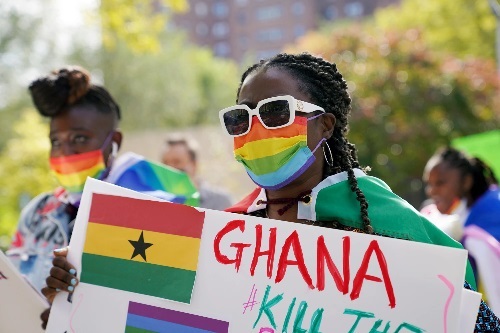
Are LGBTQIA+ rights human rights?
One of the legal highlights of the past week was the hearing at the Supreme Court of the suit challenging the transmission and subsequent assent by the President of the Human and Sexual Rights and Family Values Bill, otherwise known as the Anti-Gay Bill and the Supreme Court ordering the parties to re-file their respective processes.
The bill, which has generated a lot of debate, angst, brouhaha and has polarised the country, was spawned with the tabling of a Private Members Bill by a group of MPs led by Sam George.
It essentially seeks to criminalise homosexual activities. Any advocate of LGBTQIA + rights also could potentially be imprisoned. Before delving into whether or not LGBTQIA+ rights, are indeed human rights and worthy of protection, it will be germane to explain what they actually mean.
The L stands for Lesbian (women attracted to women); the G stands for Gay (men attracted to men although the term can also include women attracted to women); B stands for Bisexual, that is, (attracted to both men and women); T stands for Transgender (people whose gender doesn't match the sex assigned to them at birth); the Q is an abbreviation of Queer (a reclaimed term often used by those who identify as LGBTQIA+; I represents Intersex (born with both male and female characteristics); the A stands for Asexual (attracted to no one) The + sign is an abbreviation denoting all other sexual identities, such as, two spirit, pansexual, gender fluid and more.
Sexual orientation according to Wikipedia is an enduring personal pattern of romantic or sexual attraction to persons of the opposite sex or gender, the same sex or gender, or to both sexes or more than one gender.
Are LGBTQIA + rights human rights? This question is relevant if we are to understand and appreciate why the Bill is being challenged. The answer to the question is beyond debate as LGBTQIA + rights are incontrovertibly and unassailably human rights within the dictates of the Universal Declaration of Human Rights (UDHR).
Articles
The opening articles of the UDHR sheds light on the above contention. Article 1 of UDHR declares – “all human beings are born free and equal in dignity and rights”. Article 2, as far as materially relevant to the argument, states that “everyone is entitled to all the rights and freedoms set forth in this Declaration”.
The various rights detailed in the UDHR include, but are not limited to, non discrimination on the basis of a person's sexual orientation, gender identity or expression or sex characteristics, right to privacy, freedom of speech and expression. It stands to reason therefore, that LGBTQIA+ persons are deserving of the above rights as prescribed.
Further, a few utterances of leading personalities of the United Nations (UN) lend credence to the assertion that indeed LGBTQIA + rights are human rights. The UN Secretary General, Antonio Guterres, on May 11, 2023, while commenting on the growing violence against LGBTQIA+ persons, said, “each assault on LGBTQIA+ people is an assault on human rights and the values we hold dear.
We cannot and will not move backwards. The UN family stands with the LGBTQIA + community, and will continue working until human rights and dignity are a reality for all people”.
In the same year, 2023, the UN High Commissioner for Human Rights, Volker Turk, said on May 17 that “the human rights of all LGBTQIA + people, as equal members of the human family, must be respected”.
Closer to home, our own Kofi Annan, during his tenure as UN Secretary General, was a vociferous champion of LGBTQIA + rights. Also significant is the fact that in June 2010, the Human Rights Council of the UN took an historic step by adopting a resolution to protect the rights of gay, lesbians, bisexual and transgendered persons, helping to establish that sexual orientation cannot be grounds for discrimination and the abuse of human rights.
The international human rights regime enjoins states to promote, as well as protect the human rights of all persons. States are also obligated to prohibit discrimination based on sexual orientation, gender identity and sex characteristics and safeguarding freedoms of expression, association and peaceful assembly of all persons inclusive of LGBTQIA+ people.
Has our dear country complied?
The writer is a lawyer.
E-mail:
